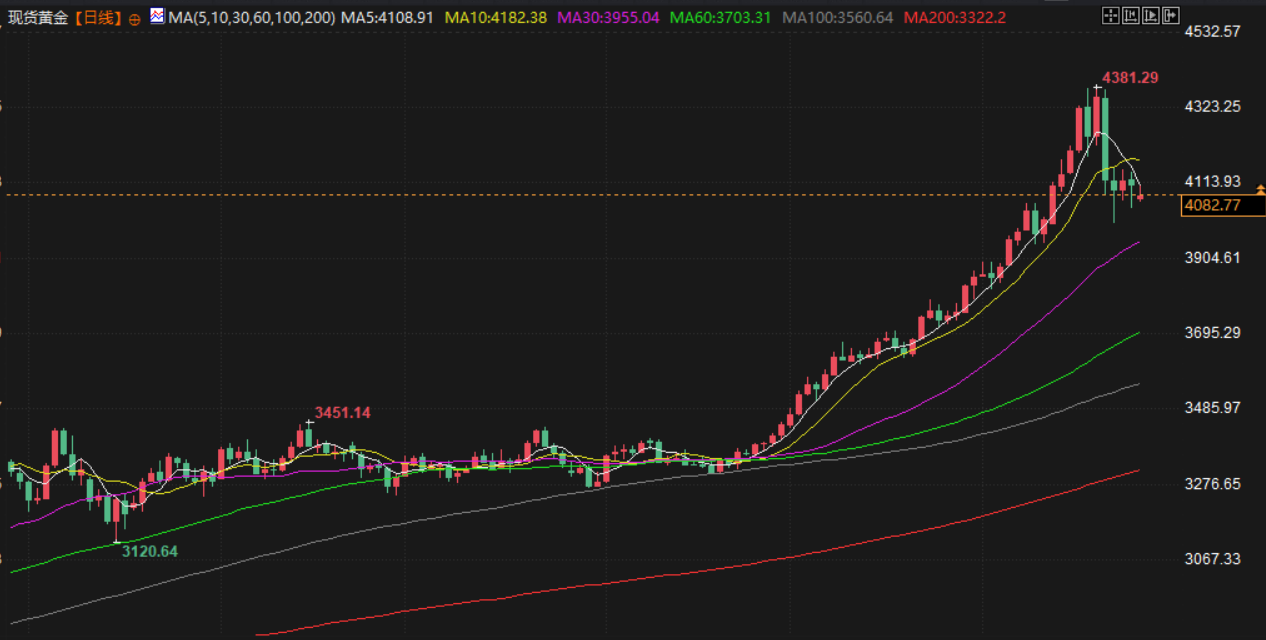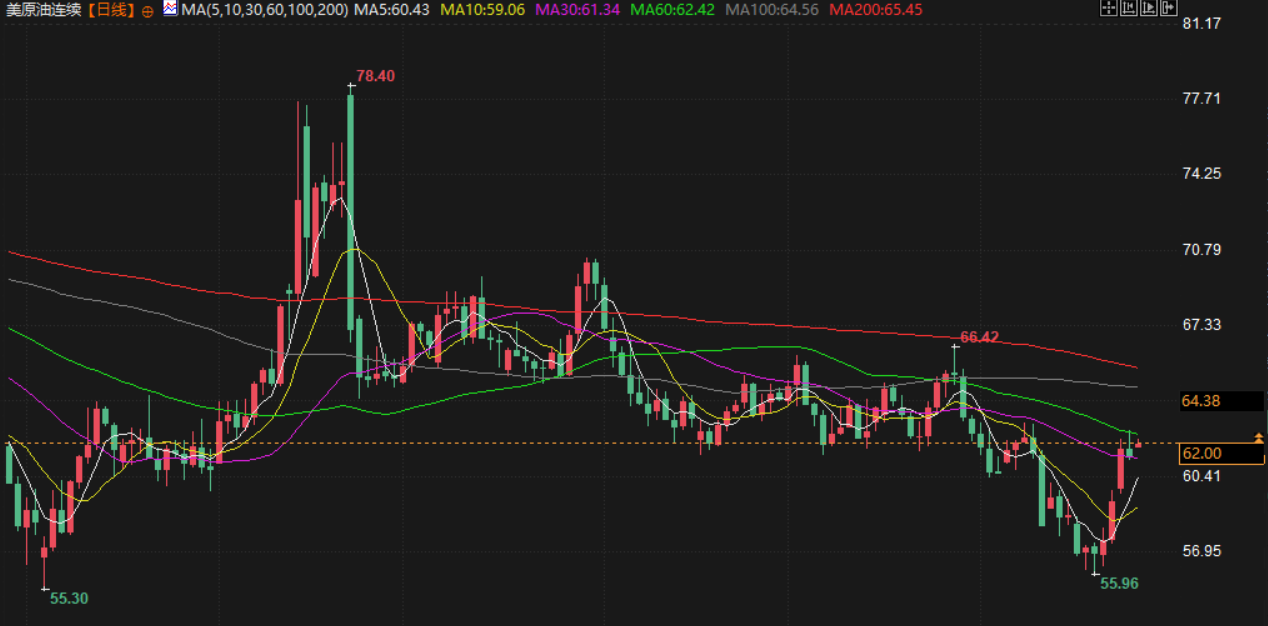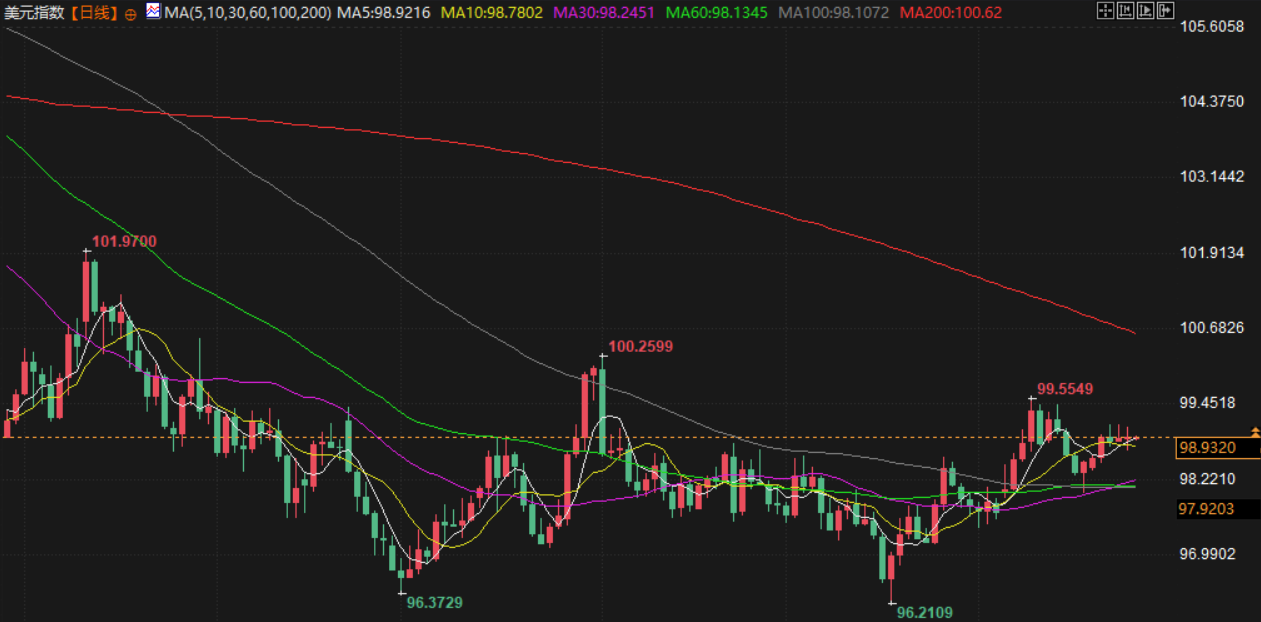October 27th Financial Breakfast: Trade tensions ease, gold prices record their first weekly decline in 10 weeks, and the market assesses the impact of US sanctions on Russian oil.
2025-10-27 07:20:41

Focus on the day

China's September profit data for industrial enterprises above designated size, Germany's October IFO business climate index, and the UK's October CBI retail sales difference.
stock market
All three major U.S. stock indexes closed at record highs on Friday as weaker-than-expected U.S. inflation data and strong corporate earnings paved the way for this week's earnings releases and an expected interest rate cut from the Federal Reserve. The S&P 500 and Nasdaq posted their biggest weekly gains since August, while the blue-chip Dow Jones Industrial Average notched its biggest weekly gain since June.
The U.S. Labor Department's consumer price index for September remained high but slightly below analysts' expectations, which calmed concerns that tariffs would have too much impact on inflation and almost confirmed that the Federal Reserve will cut interest rates by 25 basis points at the end of its monetary policy meeting next week.
The CPI report has become a rare economic indicator as official data releases have generally stalled due to the government shutdown caused by the congressional budget deadlock.
"We got some good news on the inflation front with a benign CPI number that opens the door for a rate cut from the Fed next week or even in December," said Ryan Detrick, chief market strategist at Carson Group.
According to data from the London Stock Exchange Group (LSEG), 143 companies in the S&P 500 index have reported third-quarter earnings.
Analysts currently expect S&P 500 third-quarter earnings to grow 10.4% year-over-year. This marks a significant improvement compared to LSEG's estimate of 8.8% annual growth as of October 1.
Detrick added: "This earnings season is off to a stellar start, with 87% of companies beating earnings expectations and 83% beating revenue expectations. This not only supports the stock market's gains this year, but also could pave the way for a strong rebound into the end of the year."
This week will see a slew of major earnings reports from companies, with Meta Platforms, Microsoft, Alphabet, Amazon, and Apple all vying for attention. These five companies represent the "Big Seven" of large-cap momentum stocks. Industrial stocks like Caterpillar and Boeing will also be in the spotlight.
The Dow Jones Industrial Average rose 1.01% to 47,207.12, the S&P 500 gained 0.79% to 6791.69 and the Nasdaq Composite added 1.15% to 23204.87.
Alphabet shares rose 2.7% after Anthropic expanded its partnership with Google to use up to one million Google artificial intelligence chips to train its Claude chatbot.
Coinbase Global's stock surged 9.8% after JPMorgan Chase upgraded the stock to "overweight" from "neutral."
Deckers Outdoor forecast full-year sales below Wall Street expectations, sending the Hoka athletic shoe maker's shares tumbling 15.2%. Ford Motor's third-quarter profit beat expectations, sending its shares soaring 12.2%. General Dynamics also beat expectations, sending its shares up 2.7%. Alaska Air shares fell 6.1% after the company lowered its annual forecast.
Gold Market
Gold prices pared losses on Friday but posted their first weekly loss in 10 after U.S. inflation data came in slightly below expectations, reinforcing expectations of a Federal Reserve interest rate cut.

Spot gold fell 0.2% to $4,118.29 per ounce, having initially tumbled nearly 2% in early trading. Gold prices fell more than 3% last week. U.S. gold futures for December delivery settled down 0.2% at $4,137.80 per ounce.
Independent metals trader Tai Wong said gold and silver rebounded after the lower-than-expected core CPI for September, but this may not be enough to completely curb last week's decline. Price action suggests that gold, and especially silver, need to fall further before consolidating.
Spot gold hit a record high of $4,381.21 on Monday but has since fallen more than 6% as investors booked profits and signs of easing trade tensions curbed safe-haven demand.
Spot silver was trading at $48.65 an ounce, down 0.6%, extending its weekly decline to over 6%. Data from the U.S. Labor Department showed that U.S. consumer prices rose 3.0% in the 12 months through September, slightly below the 3.1% increase economists expected.
Traders expect the Federal Reserve to almost certainly cut interest rates at its meeting this week and expect another rate cut in December. A rate cut reduces the opportunity cost of holding non-interest-bearing assets such as gold.
Gold prices have risen 55% this year, driven by factors such as geopolitical and trade tensions, strong central bank buying and expectations of U.S. interest rate cuts.
Among other precious metals, platinum fell 1% to $1,608.77 and palladium fell 0.5% to $1,450.05.
Oil Market
Oil prices fell on Friday as doubts grew about whether the Trump administration would strictly enforce sanctions on two major Russian oil companies. Brent crude futures settled down 0.1% at $65.94 a barrel, while U.S. crude futures fell 0.5% to $61.50 a barrel.

Both benchmarks rose in early trading, extending gains of more than 5% seen after the sanctions were announced last Thursday, but retreated in the final two hours of trading. Both benchmarks still rose more than 7% last week, their biggest weekly gains since mid-June.
“There’s renewed doubt that these sanctions will be as severe as they’ve been said,” said John Kilduff, partner at Again Capital LLC.
U.S. President Trump imposed sanctions on Rosneft and Lukoil to pressure Russian President Vladimir Putin to end the war in Ukraine.
Together, the two companies account for over 5% of global oil production. In 2024, Russia was expected to be the world's second-largest crude oil producer after the United States. Industry insiders say Indian refineries, the largest buyer of Russian seaborne crude oil, will significantly reduce their imports.
“Crude oil flows to India are particularly at risk,” Janiv Shah, vice president of oil market analysis at Rystad Energy, said in a note to clients.
Kuwait's oil minister said the Organization of the Petroleum Exporting Countries (OPEC) would be ready to make up any shortfall in the market by raising production.
foreign exchange market
The dollar was little changed on Friday after new inflation data showed U.S. consumer prices rose less than expected in September, keeping the Federal Reserve on track to cut interest rates again this week.

The U.S. Consumer Price Index (CPI) rose 0.3% month-over-month in September and 3.0% year-over-year. Economists polled by Reuters expected the CPI to rise 0.4% last month and 3.1% year-over-year. The U.S. dollar index fell 0.021% to 98.934 in late New York trading, having earlier fallen as much as 0.2%, but still saw a slight increase last week.
Marc Chandler, chief market strategist at Bannockburn Capital Markets, said: "The headline CPI was a bit softer than expected, prompting a sell-off in the dollar, even though the market had almost 100% confidence before the report that the Fed would cut interest rates not only this week but also in December." The CPI report was released despite the government shutdown preventing economic data from being released. The data is used by the Social Security Administration to calculate cost-of-living adjustments for millions of retirees and other benefit recipients and was originally due on October 15th.
The euro was trading at $1.163 against the dollar in late New York, up 0.06%. A survey last Friday showed that business activity in the euro zone grew faster than expected in October, driven by the euro zone's services sector.
An advertisement released in Ontario, Canada, quoted a recording of former US President Ronald Reagan criticizing tariffs. US President Trump announced the end of all trade negotiations with Canada, putting trade war concerns back on the agenda. The Canadian dollar fell slightly by C$1.40 against the US dollar in late trading, but the overall market reaction was rather muted.
New U.S. sanctions on two major Russian oil companies over Russia's war in Ukraine have pushed up oil prices. This has weighed on currencies tied to oil imports, including the yen. The yen's fate is also closely tied to the policies of Japan's new Prime Minister, Sanae Takaichi, who is widely considered a fiscal and monetary dovish.
The yen weakened to a two-week low against the dollar, last trading at 152.85 yen. Data released last Friday showed that Japan's core consumer price index (CPI) rose 2.9% year-on-year in September, above the Bank of Japan's 2% inflation target, keeping market expectations of a near-term interest rate hike alive.
Takami is preparing an economic stimulus package that could exceed last year's $92 billion to help Japanese households cope with inflation, a government source familiar with the plans said last Wednesday.
Sterling fell 0.15% to $1.33 after stronger-than-expected UK retail sales data. The pound fell about 1% last week after weak inflation data led investors to increase expectations for a Bank of England interest rate cut this year.
International News
Trump says US will impose 10% tariff on Canadian goods
US President Trump posted on the social media platform Truth Social that Canada had been caught red-handed running a fraudulent ad that tampered with Ronald Reagan's tariff speech. The Reagan Foundation stated that Canada had "selected audio and video clips of President Ronald Reagan for an advertising campaign that distorted the original meaning of the President's radio address" and "used and edited these remarks without seeking permission or obtaining authorization." Based on Canada's gross misrepresentation and hostile behavior, the Foundation has decided to impose a 10% tariff on top of Canada's current tariff payments.
Trump overturns Biden administration-era regulations on copper smelters
U.S. President Donald Trump overturned an air pollution regulation from the Biden administration that had imposed stricter limits on emissions from copper smelters. The "New Copper Smelter Rule," officially finalized in May 2024, requires copper smelters to control emissions of pollutants such as lead, arsenic, mercury, benzene and dioxins in accordance with updated federal air quality standards. The announcement issued by Trump provides a two-year compliance exemption period for affected stationary pollution sources (specifically copper smelters). The White House said the move will help improve U.S. mineral security by reducing the regulatory burden on domestic copper producers. When announcing the adjustment, the White House said: "Imposing such requirements on this limited and already stressed domestic industry could accelerate more plant closures, weaken the nation's industrial base, undermine the ability to independently supply minerals, and increase dependence on foreign-controlled processing capacity."
Major European rating agencies downgrade U.S. sovereign credit rating
European credit rating agency Scope Ratings recently released a report downgrading the US sovereign credit rating from "AA" to "AA-" due to the continued deterioration of the US public finances and declining governance standards. The agency stated that the continued deterioration of the US public finances is primarily manifested in persistently high fiscal deficits, rising interest payments, and limited budget flexibility. These factors have collectively contributed to the continued rise in government debt. The report projects that without substantial reforms, US government debt-to-GDP ratio will rise to 140% by 2030, significantly higher than that of most sovereign nations. The report also cited declining governance standards as a significant factor in the downgrade. The agency believes that the increasing concentration of executive power in the US, coupled with the Trump administration's repeated disregard for court orders, challenges to judicial authority, and circumvention of congressional oversight, has reduced the predictability and stability of policymaking and increased the risk of policy errors. The uncertainty displayed by the US in tariff negotiations with major trading partners is a case in point. The agency also stated that the US rating outlook is "stable," and that the risks of an upward and downward rating adjustment are generally balanced over the next 12 to 18 months. The report highlights downside risks including continued rising debt levels and a potential significant weakening of the US dollar's role as a global reserve currency, leading to a decline in global demand for US Treasury bonds. Scope Ratings, headquartered in Berlin, Germany, became the first European credit rating agency to be recognized by the European Central Bank in 2023. Its credit rating system includes two levels above "AA." (CCTV News)
US congressman: US government shutdown may last until the end of November
Republican U.S. Representative Ana Paulina Luna said the government shutdown could last until the end of November. "I've heard that we might not be able to get back to normal operations until Thanksgiving or even later," Luna said in an interview with Fox News. This year's Thanksgiving in the United States falls on November 27th.
US government shutdown causes air traffic controller shortages, thousands of flight delays
On the 26th local time, U.S. Transportation Secretary Sean Duffy stated that more than 20 air traffic controller shortages were reported at airports across the country on the 25th. According to data from flight tracking websites, more than 5,300 flights were delayed in the United States on the 25th; as of 4:00 PM on the 26th, more than 4,700 flights had been delayed. Since the US government shutdown, the already short-staffed air traffic control has become even more stretched, and flights at many airports in the United States have been significantly delayed. The government warned that since air traffic controllers will not receive any salary for the first time on the 28th, the shortage of air traffic controllers will be further exacerbated in the coming days, leading to more flight delays and cancellations. (CCTV)
As the government shutdown continues, food aid for low-income Americans will end on November 1st.
According to CCTV News, on October 25th, local time, the U.S. Department of Agriculture posted a notice on its website announcing that the federal government's Supplemental Nutrition Assistance Program (SNAP) will cease on November 1st. The USDA cited depleted funding as a reason for the program's discontinuation. Currently, no benefits will be disbursed on November 1st. The SNAP covers approximately 42 million people, primarily low-income individuals, the disabled, and the elderly, who can use government-subsidized food stamps to purchase food at designated stores.
California Governor Newsom admits he's considering a 2028 presidential run
California Governor Gavin Newsom said he would be "lying" if he denied that he was considering a plan to run for president. When asked if he would "seriously consider" running for president after the midterm elections (2026), the governor agreed. Newsom has become one of the important voices against President Trump. He has harshly criticized the Trump administration's approach to issues such as the deployment of the National Guard and the arrest of immigrants. Due to term limits, he will not be able to run for re-election as governor in 2026. Newsom has previously stated that if he decides to run for president, he needs a "reason" ("why"). Newsom said that if a person has a "compelling reason," then no matter "how difficult the process is," they can stick to it. He said: "I think the biggest challenge facing anyone running for public office is that people can see through you at a glance. If you don't have that 'why,' then you are running for the wrong reason."
US Treasury Secretary: US military salaries may be suspended until November 15 due to government shutdown
U.S. Treasury Secretary Scott Bessant stated that if the government shutdown continues, the U.S. military could stop receiving paychecks before November 15th. Republican U.S. Representative Ana Paulina Luna stated that the shutdown could last until the end of November. In an interview with CBS, Bessant said, "I think we'll be able to get them paid in early November, but by November 15th, the soldiers and service members who are risking their lives will not be getting their paychecks." White House economic advisor Kevin Hassett stated on October 5th that if the shutdown continues, it could result in a loss of approximately $15 billion in GDP per week.
Domestic News
Cui Dongshu of the China Passenger Car Association said that the national passenger car industry had a total inventory of 3.28 million vehicles at the end of September, a 39-day inventory decrease of 6 days year-on-year.
On October 25th, Cui Dongshu, Secretary-General of the China Passenger Car Association (CPCA), published a statement stating that by the end of September 2025, national passenger car inventory would reach 3.28 million vehicles, an increase of 120,000 vehicles from the previous month and 260,000 vehicles from September 2024, reflecting a peak season stocking trend. In April 2025, industry inventory reached a two-year high of 3.5 million vehicles. Despite high retail sales driven by trade-ins, manufacturers were relatively cautious in production. From May to August, automakers more rationally controlled production, reducing inventory pressure on dealers. This led to a sustained destocking period, followed by a rebound in inventory in September 2025. Manufacturer inventory accounted for 24.6% of the total, up 0.7 percentage points from the previous month. The forecasting team of the China Passenger Car Association predicts that the total sales of manufacturers will be very strong in the coming months. The existing inventory at the end of September 2025 and the comprehensive estimate of future sales will support 39 days of future sales. Compared with 50 days in September 2023 and 45 days in September 2024, the overall inventory pressure in September this year has dropped significantly.
Li Chenggang: China and the United States have reached a preliminary consensus on the safe and stable resolution of a number of important economic and trade issues
From October 25th to 26th, local time, China and the United States held economic and trade consultations in Kuala Lumpur. After the consultations, Li Chenggang, China's International Trade Representative and Vice Minister of Commerce, told Chinese and foreign media that the two sides reached a preliminary consensus on properly resolving several important economic and trade issues of mutual concern, and the next step will be to complete their respective domestic approval procedures. "Over the past month or so, China-US economic and trade relations have experienced some turbulence and fluctuations, which have attracted great global attention." Li Chenggang stated that since the China-US Geneva economic and trade talks in May of this year, China has strictly adhered to the consensus reached in multiple phone calls between the two leaders of China and the United States, faithfully and conscientiously implemented the consensus arrangements reached in the economic and trade consultations, and carefully nurtured the hard-won and relatively stable China-US economic and trade cooperation relationship. "These turbulence and fluctuations are not what China wants to see." "The US side expressed a tough position, and China is determined to safeguard its interests." Li Chenggang said that during the consultations, the Chinese and US economic and trade teams always respected each other and engaged in equal dialogue. Going forward, the two sides will further strengthen communication and exchanges and make positive efforts for a more stable and healthy development of China-US economic and trade relations. (Xinhua News Agency)
- Risk Warning and Disclaimer
- The market involves risk, and trading may not be suitable for all investors. This article is for reference only and does not constitute personal investment advice, nor does it take into account certain users’ specific investment objectives, financial situation, or other needs. Any investment decisions made based on this information are at your own risk.





















